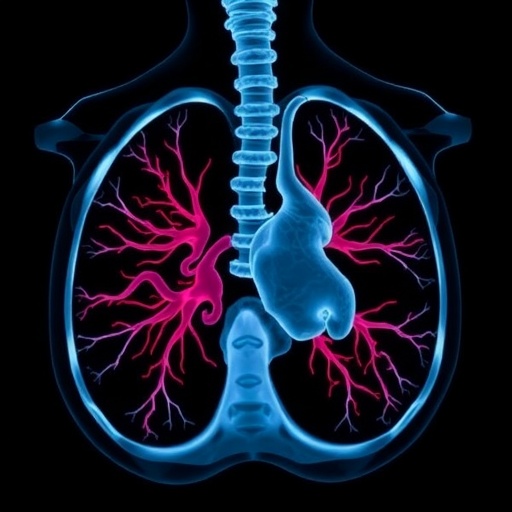(Barcelona, Spain, September 9, 2025, 10:15 a.m. CEST / UTC +2) — Groundbreaking findings from a randomized Phase II clinical trial conducted by National Taiwan University Hospital have revealed significant early evidence suggesting that surgical removal of the primary thoracic tumor following EGFR tyrosine kinase inhibitor (TKI) therapy may substantially prolong disease control in patients diagnosed with metastatic EGFR-mutated non-small cell lung cancer (NSCLC). This study, showcased at the 2025 World Conference on Lung Cancer (WCLC), organized by the International Association for the Study of Lung Cancer (IASLC), marks a pivotal advancement in the evolving therapeutic landscape for this aggressive cancer subtype.
Targeted therapies with EGFR TKIs such as afatinib have revolutionized the treatment paradigm for NSCLC harboring activating EGFR mutations by effectively inhibiting oncogenic signaling pathways and improving progression-free survival (PFS). However, despite initial profound responses, resistance inevitably develops, leading to disease progression. The current trial explored an innovative combinatorial approach wherein surgical resection of the primary lung tumor is incorporated after 12 weeks of afatinib therapy to evaluate whether eliminating residual disease might suppress or delay the emergence of TKI resistance and improve long-term outcomes.
This trial represents the first prospective randomized investigation to assess the role of surgery in conjunction with targeted therapy in metastatic EGFR-mutated NSCLC, enrolling a total of 91 patients encompassing both oligometastatic and polymetastatic disease profiles. Patients were initially treated with afatinib for 12 weeks to induce maximal tumor response, after which they were randomized in a 1:1 ratio to either continue afatinib monotherapy or undergo surgical resection of the primary thoracic tumor. The surgical arm was further permitted adjunctive radiotherapy to address non-pulmonary metastatic sites at the discretion of the treating physicians. The primary goal was to achieve locoregional control through complete resection, aiming for negative margins to minimize residual disease burden.
The study’s primary endpoint was the two-year progression-free survival, with secondary endpoints including overall progression-free survival and overall survival, enabling a comprehensive assessment of the therapeutic impact. Dr. Pei-Hsing Chen, the presenting author and lead investigator, emphasized that the purpose of integrating surgery was not curative in the traditional sense but rather as a strategic modality to systematically target residual tumor burden, potentially extending the efficacy window of EGFR TKI therapy and delaying the evolution of drug-resistant clones. He noted that early results were encouraging and revealed that this dual-modality approach could set a new precedent in the management of metastatic EGFR-mutated NSCLC.
Analyses revealed a statistically significant hazard ratio of 0.48 (95% CI: 0.25–0.93; P = 0.031) favoring the surgical arm in terms of progression risk, indicating nearly a 52% reduction in the hazard of disease progression compared to continued therapy alone. Pathological assessment in resected specimens further uncovered that 29.4% of patients achieved a major pathological response (MPR), defined by significant tumor cell death or regression, while a smaller subset of 5.9% attained a pathological complete response (pCR), indicating eradication of invasive cancer cells. Intriguingly, although MPR has traditionally been correlated with improved survival in other malignancies, this relationship remains to be fully elucidated in EGFR-mutated NSCLC.
Further subgroup analyses indicated differential response patterns between common EGFR mutation types. Patients harboring exon 19 deletions exhibited a higher frequency of MPR following surgery, signaling enhanced tumor sensitivity, whereas those with the L858R point mutation demonstrated a lower hazard ratio for PFS, suggesting a more pronounced clinical benefit from the combined therapeutic approach in this subgroup. These molecular nuances underscore the heterogeneity within EGFR-mutated NSCLC and highlight the necessity of personalized treatment strategies.
Importantly, next-generation sequencing (NGS) performed on postoperative tissue samples from 30 patients revealed a high prevalence of TP53 mutations (36.6%) and co-mutations in half of the analyzed specimens. These genetic alterations are known to influence tumor behavior and therapeutic resistance. Although hazard ratios for progression associated with TP53 and co-mutations were 1.4 and 1.7 respectively, these findings did not reach statistical significance, suggesting that while these mutations may impact outcomes, larger cohorts are required to definitively delineate their prognostic value.
The integration of surgical intervention not only provided a clinical benefit in terms of disease control but also created an invaluable opportunity to obtain postoperative pathological and molecular data. This tissue acquisition is critical for advancing understanding of resistance mechanisms and tumor evolution under targeted therapy pressure. Dr. Chen highlighted that such insights might inform future selection criteria for patients most likely to benefit from combined modality treatment.
As metastatic EGFR-mutated NSCLC poses significant therapeutic challenges, these early Phase II trial results are promising and could reshape current treatment algorithms. Historically, surgery has been reserved for early-stage NSCLC, whereas metastatic cases have primarily relied on systemic therapy. This study challenges that paradigm by proposing that judicious surgical intervention complements molecularly targeted therapy to enhance durability of tumor control.
The IASLC’s 2025 World Conference on Lung Cancer continues to be the premier global forum for unveiling transformative scientific discoveries that drive improvements in lung cancer management. This trial’s findings represent a significant stride towards optimizing precision treatment approaches in thoracic oncology by leveraging the synergistic potential of targeted therapy and surgery.
Future investigations with larger patient populations and extended follow-up are warranted to confirm these findings, clarify the impact on overall survival, and refine postoperative strategies such as the role of consolidative radiotherapy. Moreover, molecular profiling of residual tumor tissue post-surgery promises to identify resistance pathways and novel therapeutic targets to inform next-generation combination regimens.
In conclusion, this Phase II randomized trial highlights an innovative clinical strategy that integrates surgical resection after EGFR TKI therapy, demonstrating early evidence of improved progression-free survival in metastatic EGFR-mutated NSCLC. This dual approach may offer a new avenue to delay drug resistance, enhance disease control, and expand personalized treatment paradigms for patients facing this challenging diagnosis.
Subject of Research:
Article Title:
News Publication Date: September 9, 2025
Web References: www.iaslc.org
References:
Image Credits:
Keywords: Lung cancer, EGFR-mutated NSCLC, afatinib, tyrosine kinase inhibitor, surgical resection, progression-free survival, TP53 mutation, major pathological response




